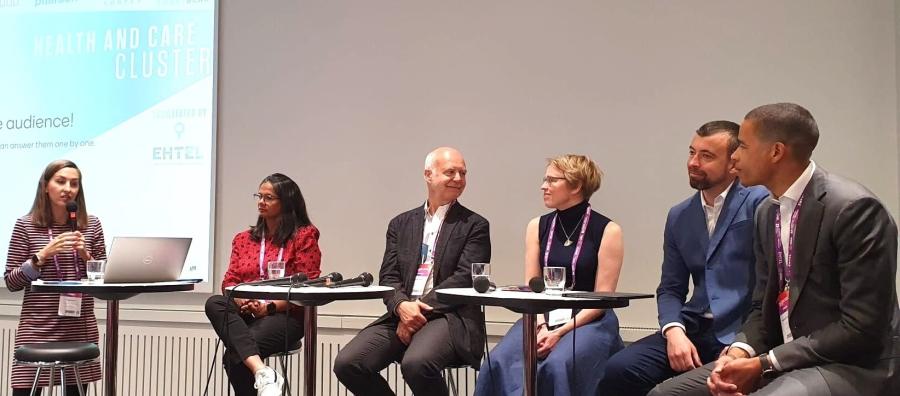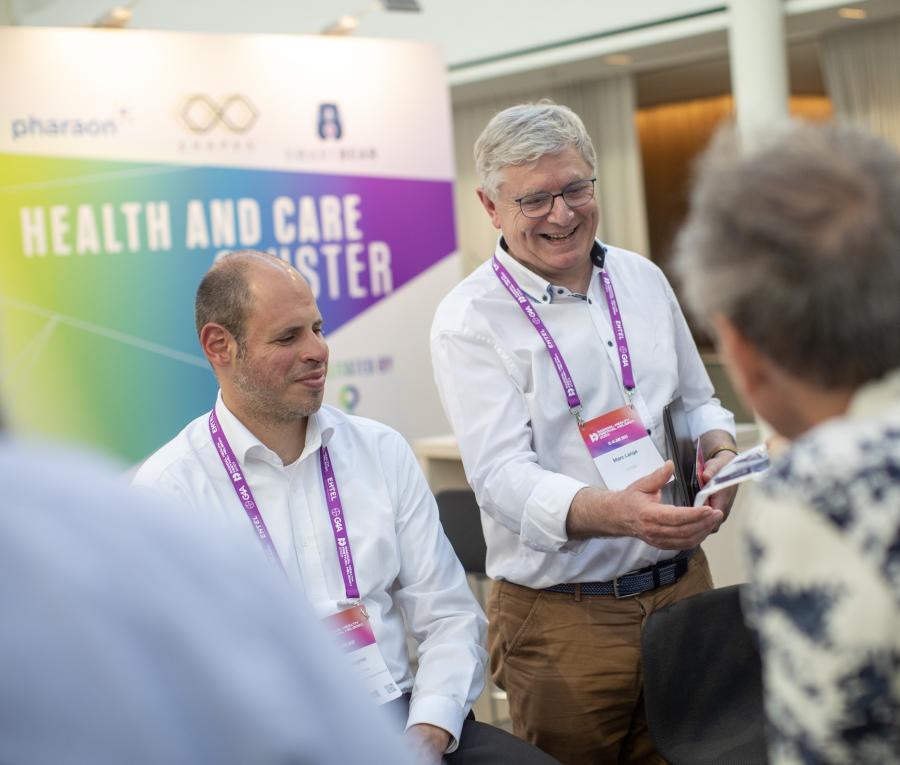On 12 and 13 June 2023, EHTEL participated at the first edition of the Radical Health Festival Helsinki 2023. It organised two Health and Care Cluster sessions, featuring seven large-scale pilots, that discussed AI-based smart hospitals and digital health services for Active and Healthy Living. The agenda also included an EHTEL Master Class on digital transformation in European regions. Ultimately, the main learning was about how digital platforms can really help to improve learning.
AI deployment challenges and opportunities in hospitals
One of the very first sessions of the Festival was dedicated to three large-scale pilot projects, all participants in the Health and Care Cluster. They presented their experiences and challenges on implementing Artificial Intelligence (AI) in hospitals.
This session offered an opportunity for discussion with key stakeholders on what these AI challenges are and how to approach them. The focus was on several core issues: data quality, patient privacy and ethical considerations on AI access to patient data, AI implementation and integration, and resistance to change.
The AICCELERATE project presented how AI will change the management of Parkinson disease through several tools. Included were decision-support tools for doctors and AI-enhanced devices and apps for remote monitoring, such as smart medicine dispensers and tracking wearables. Integration of these technical tools in existing platforms and an evidence-based approach are key to attracting doctors’ interest. According to the project coordinators, patients are willing to try using AI and remote monitoring, if it is made clear how they or their doctors can benefit from it.
Next, HOSMARTAI showcased its approach to glioma, a rare disease that requires personalised treatment. A digital health research platform was set up to enable multimodal data and advanced AI-driven analytics that enable prediction based on deep learning. Unlocking hospital data in a secure way and making it available for research involves a variety of hospital departments. It was argued that stakeholder training is key to understanding security and standardisation procedures.

Finally, the ODIN project focused on sleep disorders such as obstructive sleep apnea, a condition with a high prevalence worldwide. Its solution aims to improve diagnosis. Diagnosis improves through fetching remote monitoring data and applying AI with models trained by federated learning, and by leveraging high volume and more diverse datasets. AI has the potential to improve sleep disorder diagnosis, customise treatment plans and reduce the workload of technicians.
Discussions dealt with post-project implementation challenges: Integration and standardisation are the two main challenges, and solutions include AI regulations and risk management tools. Involving lawyers from the start of any initiative can help reduce implementation barriers. A consensus is definitely needed on how to apply AI in healthcare.
Scaling Up Digital Health Services for Active and Healthy Living
Scaling up digital health services for Active and Healthy Living was the central theme of the second session, during which five large scale pilots of the Health and Care Cluster presented and discussed the implementation challenges they have faced. Key among topics covered were useful solutions to adoption.
Many of these pilot projects have approaches in common. They have integrated “scalability by design”, and launched “open calls” to select available mature solutions that could connect with the platform they created. The session demonstrated how existing mature solutions can be successfully integrated into collaborative platforms and support advanced use cases. Specific attention was paid to the factors which influence users’ adoption and upscaling.
Session participants got to know SHAPES, a project aimed at creating a uniformed minimum standard for the care of older people. Its pilot in Oberberischer Kreis, a rural area in Germany near to the city of Köln, applied remote monitoring of key health parameters like heart rate, physical activity, sleep, nutrition, and COVID symptoms. Their conclusions? Users have a positive perception of the idea of self-care and they see a high potential in digital health solutions, in helping them to lead healthy lifestyles and reducing the necessity of healthcare visits. Interoperability at local level and reimbursement are the barriers for further adoption.

Next, PHARAON presented personalised services to foster active ageing among Italian citizens. During the implementation phase, digitisation - coupled with the fight against COVID-19 - helped to accelerate adoption. Barriers were, however, found in the lack of organisational infrastructure for technology management. “Techno stress” also played a role in the uptake experience for certain patients. Organising training sessions in digital technologies can therefore represent a suitable solution.
The final presentation came from GATEKEEPER, a project focusing on early risk detection of lifestyle-related risks in seven countries and with more than 4,000 patients. Key enabling technologies such as apps, dashboards, wearables, home sensors and online platforms for citizens were applied in eight different use cases through a series of open calls. In GATEKEEPER’s experience, demonstrating feasibility of integration, covering both the supply and demand sides and applying a clear impact assessment methodology based on MAFEIP, have all facilitated adoption.
Valuable inputs also came from the ADLIFE and SMARTBEAR projects. Contributors participated in the discussions on implementation challenges in scaling up and the role of users’ involvement in the design process.
To download all of the speakers' presentations, head on to the EHTEL website.
- Login for at skrive kommentarer
